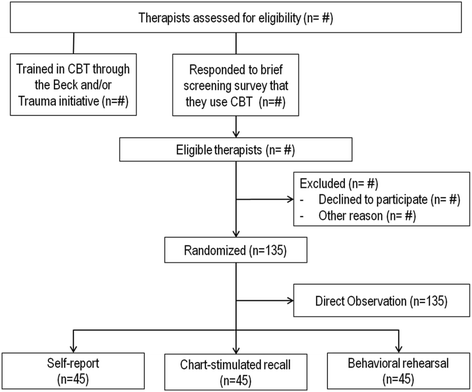A randomized trial to identify accurate and cost-effective fidelity measurement methods for cognitive-behavioral therapy: project FACTS study protocol
- PMID: 27633780
- PMCID: PMC5025620
- DOI: 10.1186/s12888-016-1034-z
A randomized trial to identify accurate and cost-effective fidelity measurement methods for cognitive-behavioral therapy: project FACTS study protocol
Abstract
Background: This randomized trial will compare three methods of assessing fidelity to cognitive-behavioral therapy (CBT) for youth to identify the most accurate and cost-effective method. The three methods include self-report (i.e., therapist completes a self-report measure on the CBT interventions used in session while circumventing some of the typical barriers to self-report), chart-stimulated recall (i.e., therapist reports on the CBT interventions used in session via an interview with a trained rater, and with the chart to assist him/her) and behavioral rehearsal (i.e., therapist demonstrates the CBT interventions used in session via a role-play with a trained rater). Direct observation will be used as the gold-standard comparison for each of the three methods.
Methods/design: This trial will recruit 135 therapists in approximately 12 community agencies in the City of Philadelphia. Therapists will be randomized to one of the three conditions. Each therapist will provide data from three unique sessions, for a total of 405 sessions. All sessions will be audio-recorded and coded using the Therapy Process Observational Coding System for Child Psychotherapy-Revised Strategies scale. This will enable comparison of each measurement approach to direct observation of therapist session behavior to determine which most accurately assesses fidelity. Cost data associated with each method will be gathered. To gather stakeholder perspectives of each measurement method, we will use purposive sampling to recruit 12 therapists from each condition (total of 36 therapists) and 12 supervisors to participate in semi-structured qualitative interviews.
Discussion: Results will provide needed information on how to accurately and cost-effectively measure therapist fidelity to CBT for youth, as well as important information about stakeholder perspectives with regard to each measurement method. Findings will inform fidelity measurement practices in future implementation studies as well as in clinical practice.
Trial registration: NCT02820623 , June 3rd, 2016.
Keywords: Cost-effectiveness; Evidence-based practice; Implementation; Treatment fidelity.
References
-
- IOM (Institute of Medicine). Psychosocial interventions for mental and substance use disorders: A framework for establishing evidence-based standards. Washington: The National Academies Press; 2015. - PubMed
Publication types
MeSH terms
Associated data
Grants and funding
LinkOut - more resources
Full Text Sources
Other Literature Sources
Medical


